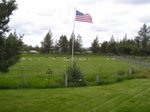Afghan Women Can Succeed in Agriculture
 Local Afghan women package harvested saffron as part of the Kentucky Agribusiness Development Team, Task Force Cyclone, Womens' Empowerment Project in Panjshir Province. The Womens' Empowerment Team of the Kentucky ADT educate women on things they can do at home, such as grow saffron and mushrooms and other things to improve their families lives.
Local Afghan women package harvested saffron as part of the Kentucky Agribusiness Development Team, Task Force Cyclone, Womens' Empowerment Project in Panjshir Province. The Womens' Empowerment Team of the Kentucky ADT educate women on things they can do at home, such as grow saffron and mushrooms and other things to improve their families lives.Photo by US Army SGT Jo Lisa Ashley, Kentucky ADT Task Force Cyclone
KAPISA PROVINCE, Afghanistan - The Kentucky Army National Guard and Air Guard united in August 2009 to form Kentucky’s first joint Agri-business Development Team.
This specialized unit is made up of service members from different backgrounds throughout the state of Kentucky.
Around 80% of Afghanistan’s populous is connected to the agriculture industry. Since Aug., the ADT has spent their deployment educating the local farmers and government on how to increase productivity, increase their market share and manage natural resources in Parwan, Panjshir, Kapisa and Bamyan provinces.
As a result of their work, the production of potatoes and onion has greatly increased in the Bamyan province.
U.S. Army Lt. Col. William T. Ewing, from Harrisburg, Ky., has a degree in Entomology and has been working with the Agricultural team during his deployment here.
“The Afghan people can grow a lot of crops,” said Ewing. “They are actually producing more than they consume or export, and we are teaching them how to export and store their crops longer.”
With the ADT’s help, pomegranate farmers in the Tagab district of the Kapisa province were able to export their crops to India and Dubai. Because they exported to these countries, they received three times their normal price for the crops.
Educating the people on natural resource management has been a key point of the ADT. Irrigation and reforestation advances should greatly improve agricultural production in Afghanistan.
U.S. Air Force Staff Sgt. Ray Norris, from Scottsburg, In., assigned to the 123rd Airlift Wing in Louisville, Ky., grew up on a family farm and volunteered to deploy with the ADT.
Norris spent some time in the Yakalong district of the Bamyan province where there is an eroded canal that provides water to about 800 family farms.
“There are not many organizations in this area helping the people,” said Norris. “We are working to get the materials so the people can make repairs themselves.”
The ADT has been working with the Minister of Agriculture, Irrigation and Livestock (MAIL), and the Director of Agriculture, Irrigation and Livestock (DAIL) at the provincial levels in the Parwan, Panjshir, Bamyan and Kapisa provinces.
U.S. Army Col. Mike D. Farley, from Corbin, Ky., is the commander of the ADT and is glad to be a part of this important and unique mission.
“We are here to help the people increase the nutritional value in the country and sustain a better and healthier lifestyle,” said Farley.
We are working directly with the MAIL and the DAIL’s, to give them the knowledge to help their people, said Farley.
The ADT has also been working to teach the women of Afghanistan techniques to improve their home life.
U.S. Army Sgt. Jo Lisa Ashley, of Eubank, Ky. is the ADT’s women’s empowerment coordinator for the team.
“Most women here work at home, they take care of their families and the household duties,” said Ashley. “I am working with them on projects that they can do at home to bring in extra income.”
The Afghan government is working side-by-side with Ministry of Women’s Affairs and they are doing a great job about going out and showing that they support these programs for the women, said Ashley.
The ADT will spend about five more months here in Afghanistan before they return home.- Written by U.S. Army Spc. Charles J. Thompson
-------------------------------------
As my readers know, I am a huge advocate of reviving the agriculture in Afghanistan and Iraq. No country can survive and prosper without the ability to feed its own people. Look at our own economy as we continue to push out agriculture. I am also an advocate for teaching skills and income making opportunities to women. Thanks to the Kentucky ADT for their efforts!














































































































2 comments:
Flag Gazer,
From what I read on your blog you are here in the Bend area. I am as well, born and raised. I didn't see an email address for you but would like to contact you. Would you email me through my blog - I'd like to get a hold of you. (Thanks!) Annie
Afghanistan used to grow a wide variety of fruits and vegetables before everything went to hell. Part of the reason they switched over to opium poppies is that many of the roads were destroyed, and getting their crops to market was almost impossible. They'd spoil.
There's an excellent article about the significance of the pomegranate orchards over on Sarah Chayes's site. Arghand. Click under "news," then, "notes from the field," and then on the latest note from Jennie over on the left. It's from November 8, 2009.
Post a Comment